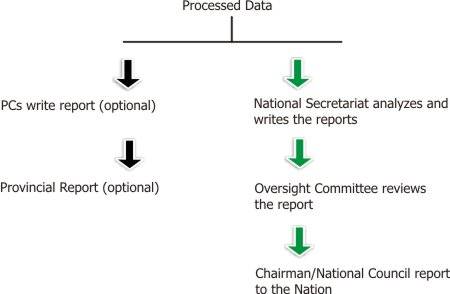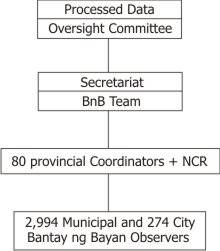.
. |
|
Bantay ng Bayan Primer
|
|
What is the Bantay ng Bayan? These are
reports on observations, findings, and recommendations on the critical aspects
of the election process given at regular intervals to the Filipino people. The
BnB is a return to the original role NAMFREL performed in 1983 when it was first
engaged in the Philippine election process.
When will the BnB reports be released? There will be
pre-election, election day, and post election reports.
Why is NAMFREL doing Bantay ng Bayan? The reports will:
|
| 1. |
promote greater awareness and understanding of
the election process |
| 2. |
contribute to building confidence in the
election |
| 3. |
support the aspiration of COMELEC to have a
free, fair and credible election |
| 4. |
refocus NAMFREL’s role in light of the
automation of the May 2010 elections |
| 5. |
engage its nationwide volunteers in the entire
election process |
| |
| Lastly, the generation of the
reports does not need accreditation from the COMELEC. |
|
|
. |
|
What are the sources of data of the BnB? |
| 1. |
Review of official documents,
materials and paraphernalia of the COMELEC (Certified Voters’ List, PCOS
machines, Ballots, Indelible ink, Book of Precinct) |
| 2. |
Research and Personal Observation
by the BnB Volunteers (Campaign materials, Indications of vote buying
and vote selling, illegal voting, unlawful electioneering, threat,
intimidation and undue influence, etc.) |
| 3. |
Interviews with Key Informants and
Resource Persons |
| 4. |
Interviews with Voters |
| 5. |
Reports from other sources (e.g.
other EMOs like AES Watch, newspaper, radio and TV reports, etc.) |
| |
.. |
|
|
How will the reports be disseminated? The
reports will be released through the following channels: |
| 1. |
Tri-media Conference |
| 2. |
NAMFREL Website |
| 3. |
Social Networking Sites |
| 4. |
E-mail dissemination to NAMFREL
Partner Organizations and other contacts |
| |
.. |
|
How are BnB reports different from news
articles or opinions in political columns or from editorials in newspapers?
The BnB reports are based on data gathered by its network of volunteers
throughout the country, using uniform data gathering instruments, based on
standards and parameters of free and fair elections practiced in all democratic
countries worldwide, and shall cover a broad range of topics on the election.
The reports are not speculative, nor simple expression of opinions, nor touching
on personalities.
What are international standards of free and fair elections?
“Everyone has the right to take part in the government of his country, directly
or through freely chosen representatives.” (Universal Declaration of Human
Rights Article 21) |
| 1. |
Transparency of the electoral
process |
| 2. |
An effective, impartial and
independent election administration body |
| 3. |
Equality for candidates and
political parties |
| 4. |
Equitable access to media |
| 5. |
Voter education programs to ensure
that voters understand the electoral process, the choices
they may vote for, and practical information on where, when and how to
vote |
| 6. |
Peaceful atmosphere in which
candidates, parties, and voters can campaign and vote |
| 7. |
Prompt publication of detailed
results |
| 8. |
Access by observers |
| |
(Source: Handbook for EU Election
Observation Missions) |
| |
.. |
|
|
What are the key success factors of the BnB? |
| 1. |
Nationwide coverage |
| 2. |
Adhering to international criteria
of free and fair elections |
| 3. |
Transparent methodology |
| 4. |
Uniform data gathering instrument
|
| 5. |
Documentation of results and
accountable forms |
| 6. |
Non-partisan data gatherers |
| 7. |
Exercise of trust at all levels |
| |
.. |
|
| Who are the players the BnB is
looking at? |
| 1. |
The Voters |
| 2. |
COMELEC
- Commission
- Board of Election Inspectors
- Board of Canvassers |
| 3. |
Candidates |
| 4. |
Political Parties |
| 5. |
Police and Military |
| 6. |
Smartmatic (Technology
Supplier) |
| 7. |
Election Monitoring
Organizations (EMOs) |
| 8. |
PPCRV (Citizens’ Arm) |
| 9. |
Media |
| |
|
|
How long is the reporting
period?
Pre-election Reports will range from 8 – 20 days from distribution
of report forms to rendering the BnB Report
Election Day Report:
Critical incidents shall be reported as they happen via SMS or
telephone
Accomplished Datasheet shall be submitted on May 11, the day after
the election.
BnB reports to the nation at 12 NN and at 8 PM
Post-election Reports:
3 days after the election, integrating the Election Day Datasheet
30 days after the election |
| . |
What is the Procedure for
Generating BnB Reports?
Distribution & Collection of Data Sheets
. |
 |
.
. |
| Analysis and
Report Generation |
 |
.
. |
| Election Day Report System
(Covering 30% of precincts nationwide) |
| 1. |
Municipal or City BnB
Observers
 Observe following the BnB Datasheet
Observe following the BnB Datasheet
 Submit accomplished Datasheet to PC on May 11
Submit accomplished Datasheet to PC on May 11 |
| 2. |
Municipal or City BnB
Observers
 Observe critical incident
Observe critical incident
 send info to PC via call or SMS; PC verify, probe, and
validate info
send info to PC via call or SMS; PC verify, probe, and
validate info
 send info to National via call or SMS
send info to National via call or SMS |
| |
.. |
|
| Bantay ng Bayan Organization |
 |
| . |
| What and Who are the
Responsibility Centers in the BnB? |
| 1. |
Chairman, National
Council, Sec-Gen and Spokesman present BnB Report to the
public. |
| 2. |
Oversight Committee
(comprised of the Chairman and members of the National
Council) review BnB Reports. Members of the National Council
contribute through individual Reports. |
| 3. |
BnB Team develops the
concept, mechanics, and data gathering instruments, conducts
training, integrates the draft reports, and undertakers
tasks to ensure the quality of the BnB reports. |
| 4. |
Secretariat under the
Secretary General coordinates the various tasks in the BnB
reporting cycle, including but not limited to providing
manpower, distribution and collection of Datasheets, data
encoding, media coordination, logistics, etc. |
| 5. |
Provincial Coordinators
(PCs) oversee the reporting cycle at the provincial level,
recruit municipal and city BnB observers, conduct training
on data gathering, distribute and collect data, and develop
reports at the provincial level when necessary /
appropriate. |
| 6. |
BnB Observers (2 per
city or municipality) – organize a work plan for gathering
the data, secure official documents, observe the
developments and events required in the report period,
conduct interviews with voters and key informants, and
submit reports to the Provincial Coordinator at appointed
deadline |
| |
.. |
|
Who will make good M or C BnB
Observers?
The following qualifications are desirable: |
| 1. |
Knowledge: the election
process, rules and calendars; BnB operation |
| 2. |
Skills: oral and
written communication; keen observation; probing |
| 3. |
Attributes:
non-partisan; committed to the objectives of BnB,
resourceful, tactful; courteous |
| 4. |
Education: at least
high school level |
| |
.. |
|
| Where can we source our M or C
BnB Observers? |
| 1. |
Regular NAMFREL
volunteers |
| 2. |
Newly signed-up
Volunteers (Secretariat will endorse to the PCs) |
| 3. |
Members of partner
organizations |
| 4. |
Retirees, students,
teachers not serving as BEI |
| |
.. |
|
| Facts About the May 2010
Elections |
 |
80 Provinces, 137
Cities, 1,497 Municipalities |
| |
National:
|
1
President, 1 Vice President , 12 Senators, 230
District Representatives, 57 Party List
Representatives |
|
Local: |
80
Governors, 80 Vice Governors, 137 City Mayors, 137
City Vice Mayors, 1,497 Municipal Mayors, 1,497
Municipal Vice Mayors, and Sanggunian Members at
Province, City and Municipal levels |
|
 |
50,723,734 Registered
voters as of Jan. 15, 2010
|
 |
45,041,777 Registered voters in the 2007 elections |
| |
.. |
|
| Machines |
 |
75,471 Clustered
Precints using Precint Count Optical Scan (PCOS) Machines |
 |
6,729 Backup PCOS
Machines |
 |
Total # of machines:
82,200 PCOS Machines (actual + backup) |
 |
P 7.2 B contract price
with with Smartmatic Inc. |
 |
P 87,591 cost of
leasing each unit of PCOS |
| |
.. |
|
| Political Parties |
 |
Majority party – To be
determined |
 |
Minority parties – To
be determined |
 |
144 to run under the
Party List System |
| |
.. |
|
| . |



